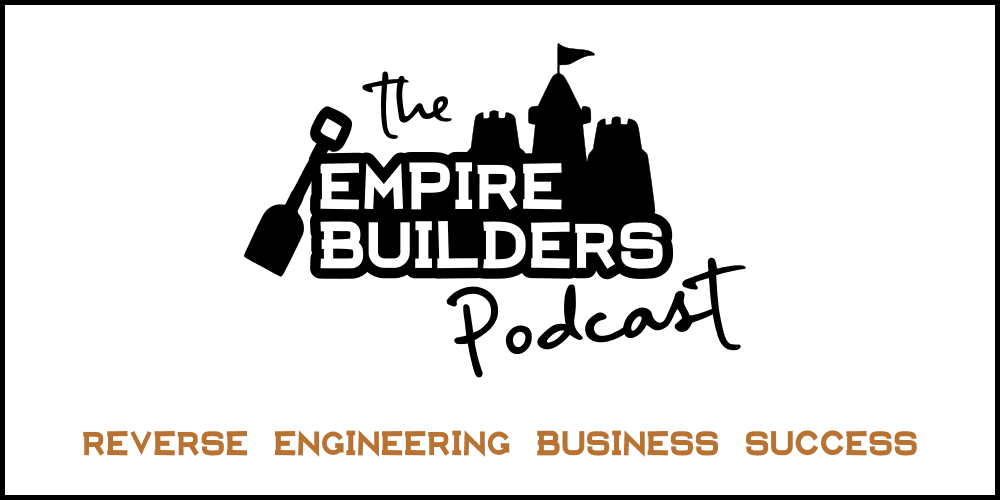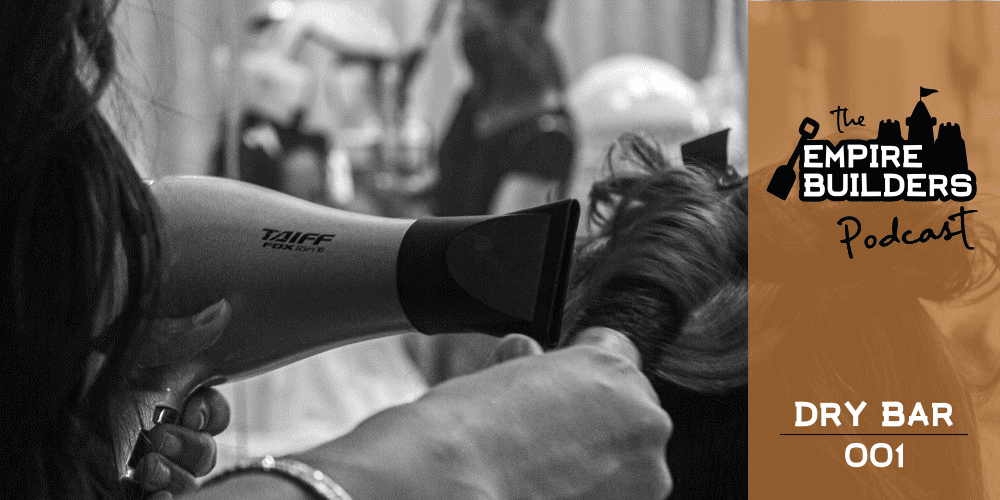This is a departure. In this episode Stephen Semple shares trends that he is seeing that is being embraced by retailers. Trends that are dangerously wrong.
David Young:
Welcome to the Empire Builders Podcast, teaching business owners the not-so-secret techniques that took famous businesses from Mom and Pop to major brands. Stephen Semple is a marketing consultant, story collector, and storyteller. I’m Stephen’s sidekick and business partner, Dave Young. Before we get into today’s episode, a word from our sponsor, which is, well it’s us. But we’re highlighting ads we’ve written and produced for our clients. So here’s one of those.
[Armadura Roof Ad]
David Young:
Stephen, we’re going to do a bit of a departure today. Tell me more.
Stephen Semple:
Instead of talking about some history of empires, we’re going to talk a little bit more about strategy and some mistakes that are easy to make, because I think we’re going to look back at this time, we’re going to look back at retailers and we’re going to see that this was a turning point and a lot of retailers really made a wrong call.
David Young:
So we may be witnessing the decline and fall of the retail empire.
Stephen Semple:
I think we are. I think we are in a lot of cases. Because here’s what I’ve been seeing. I’ve been talking to a lot of retailers and I’ve also been witnessing this, ad you’ll see this when you go to a retailing store today. There’s four things that they’re doing. One is they’re cutting their hours. Look at the hours that malls have. They’ve cut evenings. They’re not open as much as in the weekends. You go to your local store, they’ve cut hours. They’ve also cut staff. We know that, look, we can look that up in employment stats. Retailing is down unemployment. They’ve cut staff. If you go to a store today, they’ve cut inventory. They’re not carrying as much inventory. And while we also know from talking to our media buyers, because they’re in contact constantly with the media companies, is they’ve cut advertising. So they’ve cut hours, cut staff, cut inventory, cut advertising.
Stephen Semple:
And I’ve been talking to them about how this is a bad idea. They’re going, “No, Steve, you don’t understand. It’s hardly impacted my sales. It’s fine.” But here’s my thing, let’s stop and think about this. What they’ve done is cut hours, cut staff, cut inventory. So what they’ve done is they’ve made themselves less convenient, less helpful, less selection, and by cutting advertising, less known. Oh yeah, there’s a recipe for success. Meanwhile, let’s look online. Completely convenient, unlimited selection. What we’re seeing is online retailers are continually working on their website presence to make the shopping experience better. And in terms of well-known 80%, 80, 8,0 percent of US households have an Amazon Prime account that they pay for every month.
David Young:
Right. That doesn’t get you have one product.
Stephen Semple:
It doesn’t get you one product. Gets you the right to buy one without shipping costs. This is like standing in front of a firing squad and saying, “Can you please hand me a cigarette?” What they’re saying is they’re going, “Yeah, but Steve, you don’t understand. It hasn’t impacted my sales because the people who come in have bought.” Here’s my question. Are they coming back?
David Young:
Well, it it’s almost like they’re saying, “It’s not affecting my sales because I’m already dead. I just haven’t realized it yet.”
Stephen Semple:
Right. But since when is a strategy of, “I’m going to be less helpful, less convenient, less known.” Since when, of all the companies that we looked at, has there been a single one where that is a strategy that has worked? All of them have done something to make themselves more convenient, better time, better all of it. So you know what, retailers? Wake up, smell the coffee. Don’t get in front of that firing squad. Do something different. This is not a winning success strategy.
David Young:
And they’re probably not even making moves to take their own business online, to innovate and deliver things and do the kind of pivots that restaurants have had to do to stay alive.
Stephen Semple:
No, they simply have not. And here’s the other interesting thing. All of this is going to be blamed on COVID.
David Young:
Stay tuned. We’re going to wrap up this story and tell you how to apply this lesson to your business right after this.
[EMPIRE BUILDERS AD]
Brought to you by the Least Full of Shit Marketers Association of America. Yes, that’s a low bar, but we clear it mightily. We’re also the largest pay-per-performance branding group in North America and that part’s for reals. If you’re looking for advertising advice geared towards local owner-operated companies, this is your podcast. And now you can pick the brains of these advertising geniuses over lunch, without having to pay for lunch or even leave your office. We’re talking 90 minutes of straight answers to all your burning questions about lead generation, customer acquisition, mass media branding, how to get off the paper crack treadmill, anything you want. And the only coin required is candor, because we can’t give no bullshit advice without basing it off no BS data on your company, competitive landscape, operations, and all that jazz.
We send you a pre-Zoom questionnaire. You fill it out candidly, and boom, Bob’s your uncle. You’re in like Flynn. And we’ll be frank as fuck in giving you the straight scoop on all the advertising and business growth questions you always wanted to know, but we’re too afraid to ask. You’ll also get our no-pitching and no bitching guarantee. No pitching means we won’t pitch you or try to sell you in any way. If you want more after 90 minutes, you’ll have to ask. And no bitching means if you don’t think the meeting was worth your 90 minutes, we’ll send you 100 bucks. Consider it us picking up the tab for lunch and putting our money where our mouth is. Sound like a not so full of shit offer? Well, that is what we’re known for. Take us up on it at theempirebuilderspodcast.com.
David Young:
Let’s pick up our story of where we left off, and trust me, you haven’t missed a thing.
Stephen Semple:
And here’s the other interesting thing, all of this is going to be blamed on COVID.
David Young:
Yeah. 100% it’ll be blamed on COVID.
Stephen Semple:
It’s not COVID. Before COVID hit, so there’s a concept, the fusion of innovation, which talks about how quickly innovative ideas move. And there’s a tipping point where innovation catches fire, and the tipping point around 12, 15% adoption of technology. And basically that’s where things explode and it gets going. In December 2020, sorry, December 2019. So pre-COVID. December 2019, according to MasterCard and Visa, online retail sales hit 15% of the retail market. So it hit the tipping point in December of 2019.
David Young:
Just in time for the pandemic.
Stephen Semple:
So guess what? It was going to explode anyway. So something that was at the tipping point, ready to go insane, we then took a big can of gasoline and threw it on top of it. Now we’re going to blame it on the can of gasoline. I got news for you. The fire was already burning. So if you’re a retailer, here’s what you need to figure out, is how to do a better job for your customer or your customer will go somewhere else.
David Young:
Absolutely. You can hear them blaming it now. They’re winding up that talk. This reminds me, and I was going to share this story in another episode, but I think it’s applicable. It’s the same thing. 20 years ago in the little town that I lived, this town was 100 from the nearest mall, 100 miles.
Stephen Semple:
Right.
David Young:
You couldn’t get a Starbucks in this town of 6,000 people. But it had a Main Street. It had shoe stores and clothing stores and a hardware store and all the little stores that you see on a Main Street. And I was in the radio business there. They wouldn’t keep their doors open past 5:00. They wouldn’t do it. You could literally get off work at 5:00, get in your car, load up the kids, drive 100 to the mall and still be able to shop for an hour or two, and enjoy a nice meal, and then come home. And in fact, you’d see some of these store owners in the mall. And the same thing, and this was their behavior before Walmart came to town and kicked their asses.
Stephen Semple:
Yeah. And then they blamed it on Walmart, but the writing was already there.
David Young:
The writing was on the wall before that ever happened, because they wouldn’t innovate and they just wouldn’t do what it took to compete against the allure of just getting in your car and driving somewhere.
Stephen Semple:
Yeah. For those who are listening to this, if you want some suggestions on what you can do, go to one of our next episodes, which is going to be on Canada Goose, because Canada Goose is one we’re going to talk about something that they have done as a retailer to blend in an online strategy. It is so simple, any retailer can do it.
David Young:
Sounds great. I know it was a departure and it feels like a bit of a rant, but I think that’s okay. I think sometimes you have to rant.
Stephen Semple:
Sometimes you got to.
David Young:
You go to just let it out.
Stephen Semple:
Therapy.
David Young:
Right. Well, we’ll see you next time for another Empire Building Podcast.
Stephen Semple:
All right. Thanks David.
David Young:
Thanks for listening to the podcast. Please share us, subscribe on your favorite podcast app, and leave us a big fat juicy five-star rating and review at Apple Podcasts. And if you’d like to schedule your own 90-minute empire-building session, you can do it at empirebuildingprogram.com.






